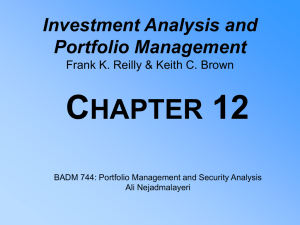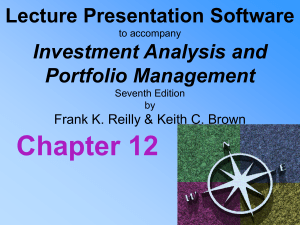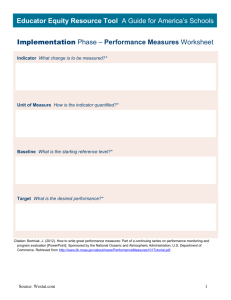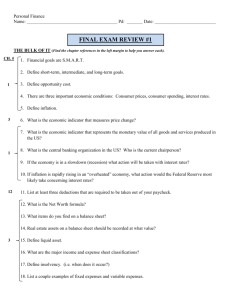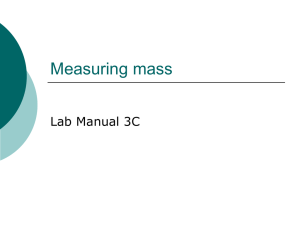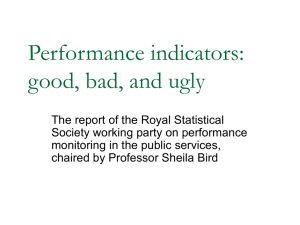Chapter 12
advertisement
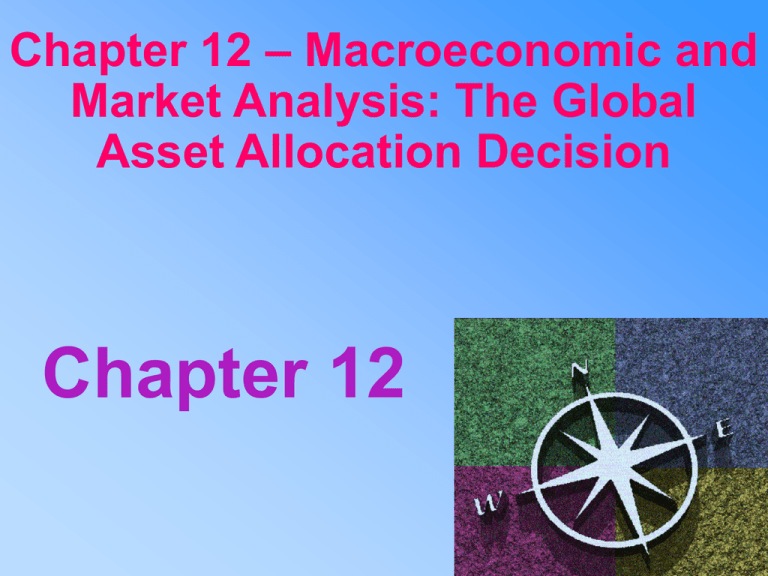
Chapter 12 – Macroeconomic and Market Analysis: The Global Asset Allocation Decision Chapter 12 Chapter 12 – Macroeconomic and Market Analysis: The Global Asset Allocation Decision Questions to be answered: • What are the expected and the empirical relationships between economic activity and security markets? • What is the macroeconomic approach to estimating future market returns? Chapter 12 • What are the major macroeconomic techniques used to project the securities market? • What is the leading economic indicator approach? What are its uses and shortcomings and can it be used to predict stock prices? • What are the expected and the empirical relationships between the growth of the money supply and stock prices? Chapter 12 • What is meant by excess liquidity and how is it measured? • What is the effect of monetary policy on stock prices in the United States and around the world? • What are the expected and the empirical relationships between inflation, interest rates, and bond prices? • What are the expected and empirical relationships between inflation and stock prices? Chapter 12 • When analyzing world security markets, what is the relationship between inflation and interest rates in alternative countries? What is the effect of inflation and interest rates on exchange rates? • How do the basic valuation variables differ among countries? • How do stock price returns among countries correlate when considering domestic returns and returns in U.S. dollars? Chapter 12 • What factors should be considered when analyzing the outlook for a foreign economy and its stock and bond market? • What is the asset allocation procedure for a global portfolio? • For a world asset allocation, what is meant by normal weighting, underweighting, and overweighting? Economies and Markets • A strong relationship exists between the economy and the stock market • Security markets reflect what is going on in an economy because the value of an investment is determined by – its expected cash flows – required rate of return Economic Activity and Security Markets Stock Market As A Leading Indicator – Stock prices reflect expectations of earnings, dividends, and interest rates – Stock market reacts to various leading indicator series – Stock prices consistently turn before the economy does Cyclical Indicator Approach to Forecasting the Economy This approach contends that the aggregate economy expands and contracts in discernable periods Cyclical Indicator Approach to Forecasting the Economy • National Bureau of Economic Research (NBER) • Cyclical indicator categories – leading indicators – coincident indicators – lagging indicators • Composite series and ratio of series Cyclical Indicator Categories • Leading indicators – economic series that usually reach peaks or troughs before corresponding peaks or troughs in aggregate economy activity • Coincident indicators – economic series that have peaks and troughs that roughly coincide with the peaks and troughs in the business cycle Cyclical Indicator Categories • Lagging indicators – economic series that experience their peaks and troughs after those of the aggregate economy • Selected series – economic series that do not fall into one of the three main groups Cyclical Indicator Approach to Forecasting the Economy • Analytical measures of performance – diffusion indexes • trends • rates of change • direction of change • comparison with previous cycles Cyclical Indicator Approach to Forecasting the Economy • Limitations of cyclical indicator approach – high variability – currency of the data and revisions – no series reflects the service sector – no series represents the global economy – political and international developments are not factored into a statistical system Cyclical Indicator Approach to Forecasting the Economy • Leading indicators and stock prices • Other leading indicator series – CIBCR: • Long-leading index • leading employment index • Leading inflation index – Analysis of alternative leading indicators of inflation – International leading indicator series – Survey of sentiment and expectations Monetary Variables, the Economy, and Stock Prices • Money supply and the economy • Money supply and stock prices • Excess liquidity and stock prices – year to year percentage change in M2 money supply adjusted for small time deposits less the year-to-year percentage change in nominal GDP Money Supply and the Economy • Declines in the rate of growth of the money supply have preceded business contraction by an average of 20 months • Increases in the rate of growth of the money supply have preceded economic expansions by about 8 months Money Supply and Stock Prices • Excess Liquidity and Stock Prices • Historical Excess Liquidity in the United States • Historical Excess Liquidity in Foreign Countries Monetary Variables, the Economy, and Stock Prices • Other economic variables and stock prices – growth in industrial production – changes in the risk premium – twists in the yield curve – measures of unanticipated inflation – changes in expected inflation during periods of volatile inflation Inflation, Interest Rates, and Security Prices • Inflation and interest rates – generally move together – investors are not good at predicting inflation • Inflation rates and bond prices – negative relationship – more effect on longer term bonds • Interest rates and stock prices – not direct and not consistent – effect varies over time Analysis of World Security Markets • Goldman, Sachs & Co. World Investing Strategy Highlights • • • • • Inflation and exchange rates Correlations among returns Individual country stock price changes Individual country analysis World asset allocation The Internet Investments Online www.ms.com www.dri.mcgraw-hill.com/index.htm www.yardeni.com www.whitehouse.gov/fsbr/esbr.html www.bog.frb.fed.us www.phil.frb.org/econ/index.html www.worldbank.org www.bankamerica.com/econ_indicator/econ_indicator.html www.personalwealth.com www.spglobal.com/index.html The Internet Investments Online www.treasury.boi.ie www.dkb.co.jp/english/index.html www.boj.or.jp/en/index.htm www.indobiz.com www.bankofengland.co.uk www.bundesbank.de/index_e.html www.banque-france.fr/gb/home.htm www.ecb.int End of Chapter 12 The Analysis of Alternative Economies and Securities Markets: The Global Asset Allocation Decision Future Topics Chapter 13 • Stock Market Analysis – Microanalysis of a country’s stock market – Application of the DDM and the FCFE models to the aggregate stock market – How to arrive at an expected market value and an expected rate of return for the stock market?
